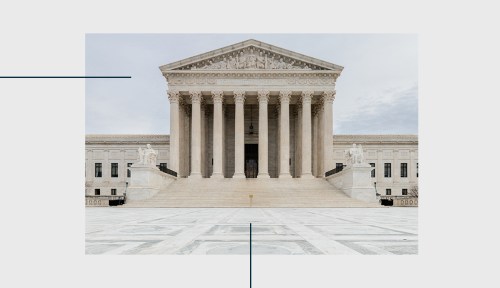The Supreme Court’s Latest Abortion Pill Ruling Poses a Dangerous Threat to Reproductive Health
The Supreme Court abortion pill ruling, which limits the use of mifepristone to in-person doctors' visits—poses a reproductive health issue.

Since the onset of the pandemic, anti-abortion lawmakers have used the growing number of COVID-19 cases as a means to block safe reproductive health-care procedures. Well+Good reported in April that such politicians considered abortions “elective procedures” (they’re not) in order to deprioritize them. On Tuesday, the Supreme Court ruled that those seeking medication to terminate pregnancy must pick up a pill in person from a hospital or medical office, effectively limiting abortion access to countless Americans.
Experts in This Article
The three remaining liberal justices offered dissent, but the conservative-leaning Supreme Court approved the Trump administration’s request to severely limit access to mifepristone, a drug approved by the U.S. Food and Drug Administration more than 20 years ago. Chief Justice John G. Roberts explains the decision in the case, FDA v. American College of Obstetricians and Gynecologists, by writing that the Supreme Court should give due credence to public health officials (like the ones at the FDA) when they opt to limit a drug. However, 71 percent of health care providers recommend protecting abortion rights in order to reduce unsafe procedures.
Visiting a doctor’s office to receive a prescription for mifepristone mean risking exposure to COVID-19 and potential refusal because of the beliefs of individual health-care providers. It also means that many people simply won’t be able to access the pills at all. As NPR reports, telemedicine is the only option for many seeking to end an unwanted pregnancy. “Telehealth plays a vital role in getting people connected to providers and obtaining care without exposure to COVID-19. Further, telehealth can help people overcome common barriers, such as transportation, cost of child care, and taking time off work, associated with impeding access to reproductive health services,” says Raegan McDonald-Mosley, MD, MPH, CEO of Power to Decide, a campaign to prevent unplanned pregnancies. “The Trump Administration’s policy requiring in person visits hinders people’s ability to access abortion care safely during a pandemic and is particularly damaging to Black, Latino, Indigenous and other people of color in addition to people living with lower incomes.” Pair those obstacles with the limited amount of clinics in many states, and those needing abortions may have to drive hundreds of miles to find the care they need.
“This country’s laws have long singled out abortions for more onerous treatment than other medical procedures that carry similar or greater risks.” —Justice Sonia Sotomayor
As Justice Sonia Sotomayor writes in her dissent, abortion restrictions such as this follow a long line of others that have historically stripped people of their right to choose what’s right for their body. “This country’s laws have long singled out abortions for more onerous treatment than other medical procedures that carry similar or greater risks,” she writes. “Like many of those laws, maintaining the FDA’s in-person requirements for picking up the drug during the pandemic not only treats abortion exceptionally, it imposes an unnecessary, irrational and unjustifiable undue burden on women seeking to exercise their right to choose.”
A new administration led by President-elect Joe Biden and Vice President-elect Kamala Harris has the opportunity to undo the FDA’s in-person requirements. “Rather than placing further barriers between abortion services and those who need care most we should focus on expanding access so all people can have the power to decide if, when and under what circumstances to get pregnant and have child. It is also important to recognize that restrictions on abortion access do not stop people from getting abortions or serve as the primary factor in reducing the abortion rate,” says Dr. McDonald-Mosley. Hopefully, in the years to come, the country’s two new leaders will do more to safeguard access to safe abortion care.
Sign Up for Our Daily Newsletter
Get all the latest in wellness, trends, food, fitness, beauty, and more delivered right to your inbox.
Got it, you've been added to our email list.










